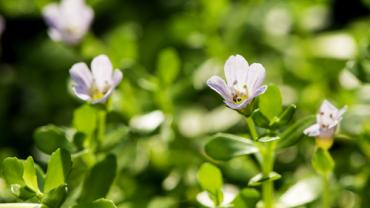
These days it seems like everyone has cognitive function on the brain – no pun intended! Whether it’s exogenous ketones, adding butter and coconut oil to coffee, or some other nutritional “hack,” people are on the lookout for anything that might give them a cerebral edge. And while these new ketone-boosting methods may be effective, we shouldn’t discount older and perhaps less glamorous methods. Shiny and new is great, but the old workhorses—the tried and true—stand the test of time because they work. Case in point: Bacopa monnieri.
Bacopa monnieri—or Bacopa—has over 1400 years of use in Ayurvedic medicine, where it is recognized to “sharpen intellect and attenuate mental deficits. The herb was allegedly used by ancient Vedic scholars to memorize lengthy sacred hymns and scriptures.” Ayurvedic texts call Bacopa a medhya rasayana—an herb that sharpens the mind and intellect. Bacopa is sometimes called Brahmi, after Brahma, the Hindu god of creation, and the herb is consistently found in Ayurvedic preparations prescribed to support cognitive function. (Brahmi usually refers to a combination of Bacopa and gotu kola, used to boost memory and mental acuity.)
Bacopa works via multiple mechanisms, including antioxidant neuroprotection, inhibiting acetylcholinesterase, increasing cerebral blood flow, and modulating the neurotransmitters serotonin, dopamine, and acetylcholine. In vivo and in vitro studies show that Bacopa inhibits the release of inflammatory cytokines from mouse microglial cells and inhibits enzymes associated with inflammation in the brain. Bacopa also inhibits inflammatory COX-2 and 5-LOX enzymes, which likely accounts for one of the herb’s other traditional applications: arthritis. (Bacopa is acknowledged in Ayurveda as an analgesic and antipyretic as well.)
A meta-analysis of randomized controlled trials evaluating the cognitive effects of Bacopa determined that it has the potential to improve cognition, particularly speed of attention. The analysis included studies where Bacopa was given for a minimum of 12 weeks, and where there was no co-medication, which helps reduce confounding and confirm Bacopa as the active agent. A separate review of RCTs that also looked at studies of Bacopa supplementation administered for at least 12 weeks (300-450 mg/day) concluded that Bacopa improves memory (free recall), and may enhance other cognitive abilities, but called for more research with standardized doses to be done on the latter.
Digging into the details, double-blind placebo controlled studies support the efficacy of Bacopa supplementation (90 days) for improving working memory (especially spatial memory) in healthy adults. Long-term supplementation may not be required for certain effects to be realized, though. In a study in which healthy adults were given acute doses of a Bacopa extract (320 mg or 640 mg) or placebo prior to completing various cognitive tests, the Bacopa resulted in improvements in performance—within just 1-2 hours after dosing. Acute dosing of Bacopa also led to slight mood enhancement and reduction in salivary cortisol, suggesting nootropic and adaptogenic effects. The study had just 17 subjects, so it was small, but the findings warrant further exploration.
Bacopa seems especially helpful for children with ADHD. Six months of supplementation with a standardized Bacopa extract (225 mg/day) resulted in impressive symptom improvements in 31 children ages 6-12 diagnosed with ADHD. Restlessness was reduced in 93% of subjects, and self-control improved in 89%. Symptom scores for learning problems, impulsivity, and psychiatric problems were reduced for 78%, 67%, and 52% of subjects, respectively. Not bad! In total subtest scores, 74% of the children exhibited up to a 20% reduction, with 26% showing between a 21% and a 50% reduction. Being that as much as 30% of children with ADHD don’t respond to common medications or eschew them due to adverse side-effects, Bacopa could be a useful adjunct to conventional therapy or used as part of a complementary approach. Systematic reviews evaluating the safety and efficacy of Bacopa in children and adolescents have found Bacopa to be safe and well-tolerated, and to be effective for improving attention and impulsivity.
If oxygen bars and exogenous ketones are the flashy sportscars of the brain-boosting world, then Bacopa is like the understated family sedan: reliable, dependable, and effective. So patients can continue adding MCT oil to their coffee or tea if they enjoy that, but they can also consider adding Bacopa to their supplement regimen if they’re concerned with supporting memory, focus, and cognitive function.